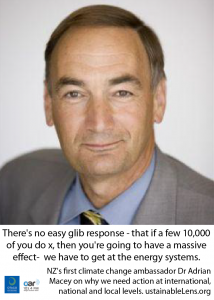We have a target gazetted to reduce emissions by half by 2050, and if you look at projections, they’re way up, double by 2050.  How do you join those things up?  There’s currently no government statements around that.  The target was put in place in 2011 but since then it’s hard to find any mention in official government statements, or any action by government departments.
A New Zealand diplomat with postings including Bankok, Tokelau, Paris and Geneva, Dr Adrian Macey was New Zealand’s first climate change ambassador Dr Adrian Macey.  He describes his proudest achievement as chairing the UNFCCC Kyoto Protocol negotiations during the critical year where it was established that there would be a second commitment period.  Dr Macey is currently with Victoria University’s Institute for Governance.
Talking points:
As a diplomat you follow the will of the government of the day but you always avoid closing options
You can see climate change as a moral issue – responsibility for future generations – you can also see it as an opportunity – if your city is using lower carbon, lower energy, that’s more money staying in the local pool.
Consumers have some ability to affect things, but it’s very hard in the absence of long-term central government policy
When you put together all the pledges that everyone has made, it doesn’t add up to what we need to do to keep warming down to 2 degrees.
Developing countries need money on the table to support their efforts on mitigation and adaptation. Â The developed countries need to take historic responsibility.
The language used is important, “grave concern” was useful to change minds.
Three factors helpful in current rounds: greater certainty, plain language, mainstream estimates.  Still worrying, doesn’t mean complacency, but looks more manageable from a policy sense.
Perverse tendency, you can’t use the fear for too long.  There’re two levers civil society has tried to use, one is fear of terrible consequences and the other is guilt or shame – you should be doing more, it’s your duty to future generations or other countries – neither of those levers can be effective indefinitely.  We’re coming back to rethinking by civil society, using another register.  One example is Greenpeace’s report on the future of energy,  looking at the future of renewable energy – that’s appealing to a different part of government.  Governments have an interest in having sensible policies, and if something looks rational and achievable – and not constant hammering about guilt and shame – then maybe that’s going to prove a more effective way through.
We need massive changes in the energy system it’s not something the citizen as an individual has much control over…individual choices of consumers – buying something with a slightly lower footprint –  are not quantitatively all that important, though they are from a moral perspective, but the big shift we’ve got to do is get off fossil fuels.
The transport sector is the one we’ve got to deal with. Â The difficulty is that our country is long, narrow and not very highly populated – but that’s the obvious area for gains.
Businesses that have a stake in our “clean green reputation” – those people are in a position to try to influence government. Â If they think that where we’re heading is a bit out of kilter with that image we have of ourselves as we start to lag behind.
There’s no easy glib response, that if a few 10,000 of you do x, then you’re going to make a massive effect, we have to get at the energy systems.
Rich countries need to accept historical responsibility,

